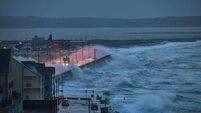Enda Kenny: Risk of violence if Brexit border talks fail

Mr Kenny says that while the UK is opting for a hard Brexit, many of their intentions remain unclear until after Article 50 is triggered next month.
He says “new ways” of having relationships will have to be thought out or the consequences could be serious.













